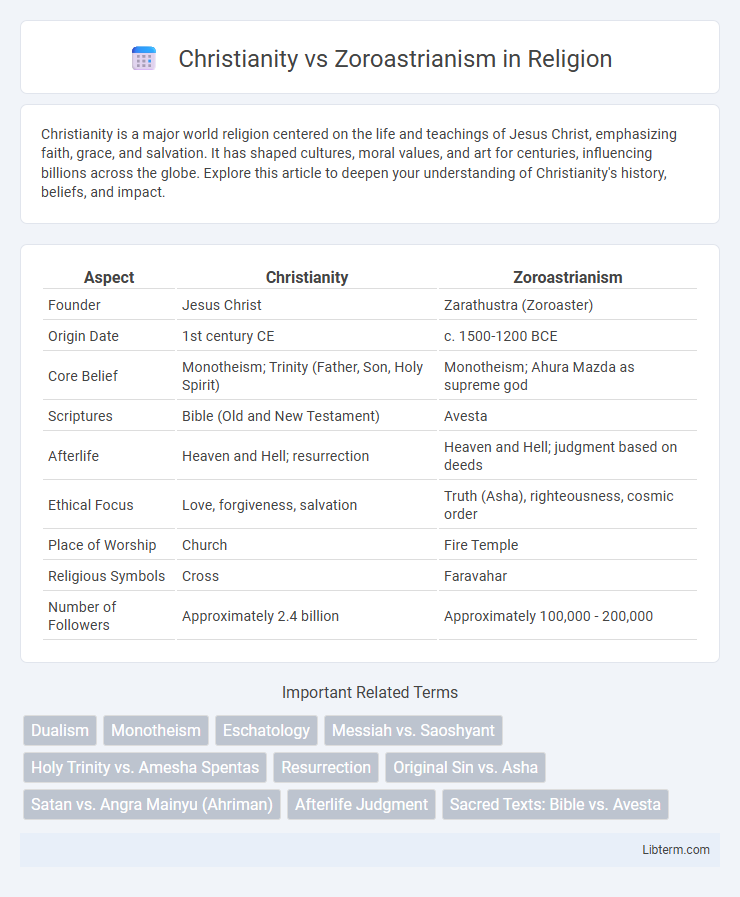Christianity is a major world religion centered on the life and teachings of Jesus Christ, emphasizing faith, grace, and salvation. It has shaped cultures, moral values, and art for centuries, influencing billions across the globe. Explore this article to deepen your understanding of Christianity's history, beliefs, and impact.
Table of Comparison
| Aspect | Christianity | Zoroastrianism |
|---|---|---|
| Founder | Jesus Christ | Zarathustra (Zoroaster) |
| Origin Date | 1st century CE | c. 1500-1200 BCE |
| Core Belief | Monotheism; Trinity (Father, Son, Holy Spirit) | Monotheism; Ahura Mazda as supreme god |
| Scriptures | Bible (Old and New Testament) | Avesta |
| Afterlife | Heaven and Hell; resurrection | Heaven and Hell; judgment based on deeds |
| Ethical Focus | Love, forgiveness, salvation | Truth (Asha), righteousness, cosmic order |
| Place of Worship | Church | Fire Temple |
| Religious Symbols | Cross | Faravahar |
| Number of Followers | Approximately 2.4 billion | Approximately 100,000 - 200,000 |
Origins and Historical Background
Christianity originated in the 1st century CE within the Roman province of Judea, emerging from Jewish traditions and centered around the life and teachings of Jesus of Nazareth. Zoroastrianism, one of the world's oldest monotheistic religions, dates back to the 6th century BCE in ancient Persia, founded by the prophet Zoroaster (or Zarathustra) who introduced concepts of dualism and ethical monotheism. Both religions deeply influenced their respective cultures and shaped theological developments in the Middle East and beyond.
Core Beliefs and Doctrines
Christianity centers on the belief in one God manifested in the Trinity--Father, Son, and Holy Spirit--and emphasizes salvation through faith in Jesus Christ's death and resurrection. Zoroastrianism is founded on the dualistic cosmic struggle between Ahura Mazda, representing truth and light, and Angra Mainyu, symbolizing evil and darkness, with a focus on individual responsibility to choose righteousness. While Christianity teaches eternal life and divine judgment, Zoroastrianism stresses moral purity and the eventual triumph of good over evil in a restored world.
God and the Divine Nature
Christianity centers on the belief in one omnipotent, omniscient God who embodies the Holy Trinity: Father, Son, and Holy Spirit, emphasizing a personal and relational Divine Nature. Zoroastrianism presents Ahura Mazda as the singular, supreme god representing ultimate wisdom and goodness, engaged in cosmic dualism with Angra Mainyu, the destructive spirit. The Christian Divine Nature is characterized by grace and incarnation through Jesus Christ, while Zoroastrianism emphasizes moral dualism and the intrinsic battle between truth (asha) and falsehood (druj).
Creation and Cosmology
Christianity teaches that God created the universe ex nihilo, establishing a linear timeline with a definitive beginning and end, emphasizing divine omnipotence and purposeful design. Zoroastrianism presents a dualistic cosmology where Ahura Mazda creates the universe as a battleground between good (Spenta Mainyu) and evil (Angra Mainyu), reflecting an ongoing cosmic struggle shaping existence. Both traditions emphasize a moral framework intertwined with cosmological order, but Christianity centers on monotheistic creation, while Zoroastrianism highlights dualistic forces influencing the cosmos.
Sacred Texts and Scriptures
Christianity's sacred texts center on the Bible, comprising the Old Testament and the New Testament, which includes the teachings of Jesus Christ and early Christian apostles. Zoroastrianism's primary scripture is the Avesta, featuring hymns, rituals, and teachings attributed to the prophet Zoroaster, with the Gathas as its most revered hymns. Both religions emphasize divine revelation and moral guidance through these foundational texts, reflecting their distinct theological traditions.
Concepts of Good and Evil
Christianity centers on the dualistic struggle between God, representing absolute good, and Satan as the embodiment of evil, with moral conduct guided by divine commandments and the promise of salvation. Zoroastrianism presents a more dualistic cosmology featuring Ahura Mazda as the supreme deity of truth and light, opposed by Angra Mainyu, the destructive spirit of falsehood and darkness, highlighting an ongoing cosmic battle for the human soul's allegiance. Both religions emphasize ethical living and righteousness, but Christianity prioritizes faith and grace for redemption, while Zoroastrianism underscores individual choice in promoting order (asha) against chaos (druj).
Salvation and the Afterlife
Christianity teaches salvation through faith in Jesus Christ, emphasizing eternal life in heaven or eternal separation in hell based on one's acceptance of Christ's grace. Zoroastrianism centers on the soul's judgment after death, where good deeds lead to crossing the Chinvat Bridge to paradise, while evil deeds result in falling into a realm of punishment. Both religions highlight moral accountability, but Christianity stresses divine forgiveness, whereas Zoroastrianism focuses on individual righteousness and cosmic dualism.
Rituals, Worship, and Practices
Christianity centers rituals around sacraments such as baptism and the Eucharist, emphasizing communal worship in churches with prayers, hymns, and sermons. Zoroastrianism involves rituals like the Yasna ceremony, fire worship symbolizing purity, and daily prayers directed toward Ahura Mazda, often performed in fire temples. Both religions maintain a strong ritualistic tradition that reflects their core theological principles of good versus evil and divine order.
Influence on Culture and Society
Christianity shaped Western legal systems, art, and holidays such as Christmas and Easter, deeply embedding themes of salvation and morality in societal values. Zoroastrianism significantly influenced Persian culture, contributing concepts of dualism and ethical responsibility that permeated later Abrahamic religions and inspired early ideas of heaven, hell, and judgment. Both religions impacted social structures through rituals, festivals, and community practices that reinforced collective identity and moral frameworks.
Comparative Legacy and Modern Relevance
Christianity's legacy is marked by its global spread, influencing Western philosophy, law, and culture, while Zoroastrianism's impact is primarily seen in ancient Persian traditions and its contribution to dualistic theology. Modern relevance of Christianity is evident in its billion-strong adherents and institutional presence worldwide, whereas Zoroastrianism, though smaller in number, persists through cultural heritage and minority communities mainly in Iran and India. Both religions contribute foundational ethical concepts, shaping contemporary interfaith dialogues and moral frameworks.
Christianity Infographic

 libterm.com
libterm.com